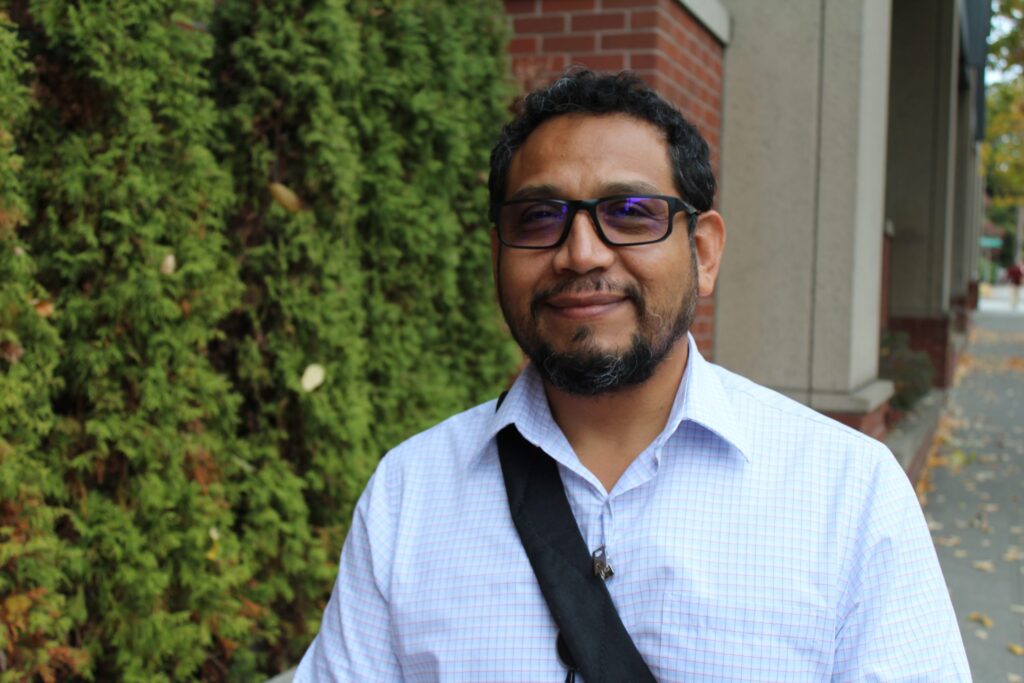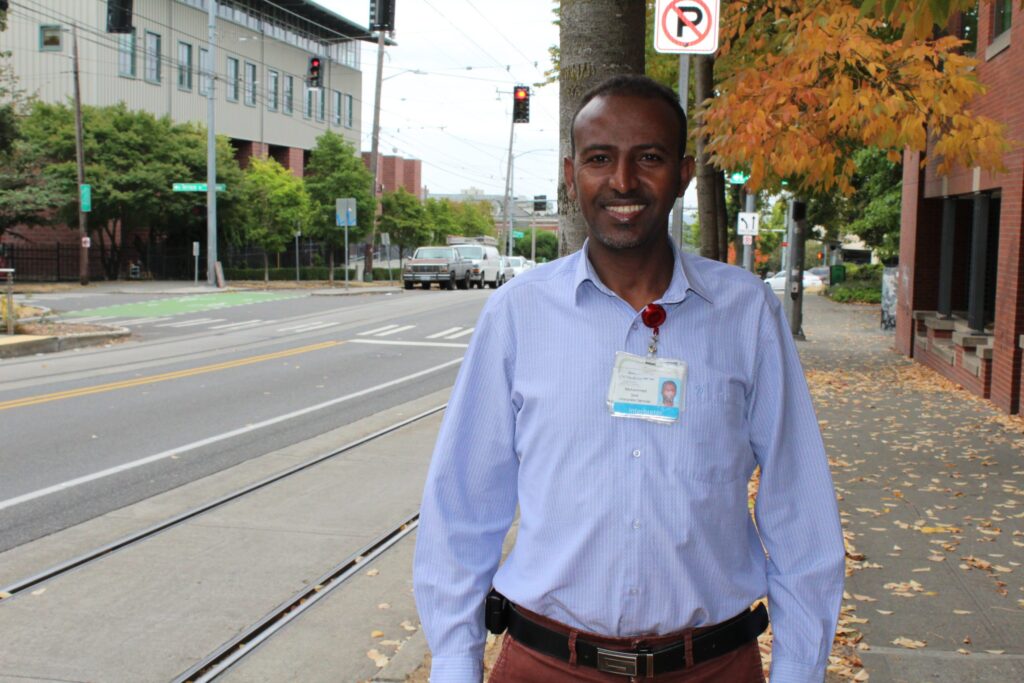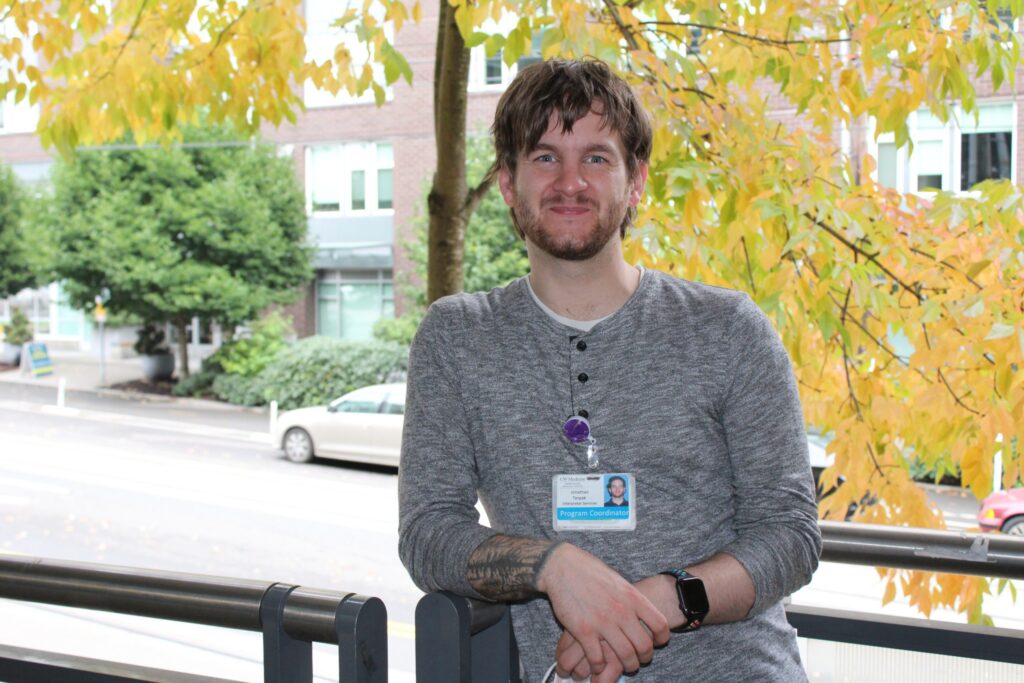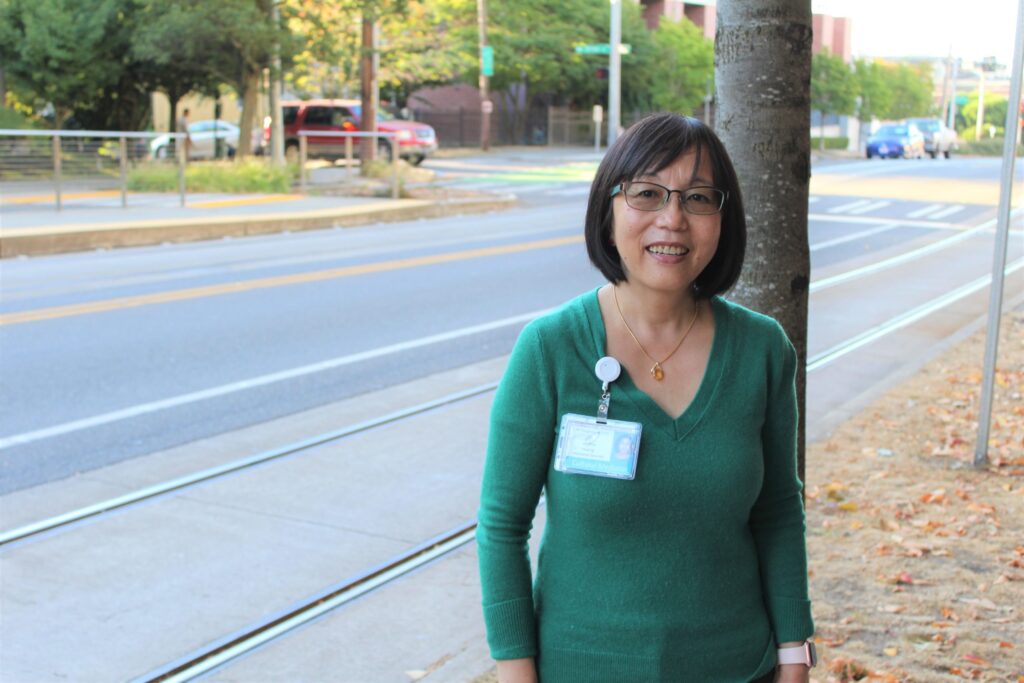Highlights | Communication is key
- The Harborview Interpreter Services Department helps patients with limited English proficiency communicate to their providers.
- The team collectively speaks more than 17 languages and schedules more than 400 encounters daily.
- The International Day of the Translator is September 30.
When it comes to healthcare, communication is key. Patients need to be able to share symptoms and ask questions, while providers need to explain conditions, procedures and treatment plans.
Enter Harborview’s Interpreter Services Department, which helps patients with limited English proficiency do just that.
“Meaningful communication between patients, their families and caregivers, and providers is at the heart of healthcare. The ability to have quality communications promotes understanding and the development of trusting relationships,” says Yuliya Speroff, a medical interpreter supervisor in the department.
The team of 37 medical interpreters, interpreter-translators and caseworker cultural mediators helps decrease healthcare disparities by providing in-person and remote interpreting services. The team collectively speaks more than 17 languages, and they partner with vendors to help with any additional needs.
And the volume of interpreter needs is high. Each day, the team schedules more than 400 in-person and remote encounters, allowing patients to access quality care.
The department also has a unique program called Community House Calls where Caseworker Cultural Mediators (CCMS) provide interpretation along with navigation, advocacy, education and case management in bridging care between the patient, family and healthcare teams for the purpose of culturally sensitive care.
In addition, the Interpreter Services Department maintains EthnoMed, a website for providers with information on the cultural beliefs and medical issues of patients from different ethnic groups, and offers written translation services for hospital documents, such as patient education materials and signage.
In celebration of the International Day of the Translator (Sept. 30) and the Interpreter Services Department, four team members share some memorable moments and what working in this field means to them.
Abel Gomez, Spanish Interpreter at Harborview for three years

Why did you decide to start a career in interpreter services?
The thing is, I was on the other side at one time. I was having difficulty understanding what people were saying, and I was having difficulty making myself understood. I decided, well, I need to learn the language so I can help others.
What is a memorable moment?
There is one specific situation: I was given my daily schedule and one of the appointments was at the Adult Medicine Clinic. The patient was an 83-year-old man. After I introduced myself, we went inside the examination room. They were talking about the situation — illnesses, medications, all the things you see in medical settings. At the end of the appointment, this was before COVID-19, the patient shook my hand and said, “I want to thank you for your service. Of all the time that I’ve been coming here, today was the first time I understood everything the doctor said.” That was something memorable for me that made me feel that I am doing something good. And not just because I’m an interpreter but the connection I had with that patient made things more meaningful.
Outside of work, what do you enjoy doing?
I like to do many things, but I will mention a couple of them. One of the things you’ll see me doing on the weekends is working on cars. I went to school to be a mechanical engineer, so when one of my vehicles needs repairs, I do that with no problem, and I save money because I do not have to take my cars to a shop. I used to work for Jaguar of Bellevue, and I was surprisingly good at repairing them, I can take one of those engines apart and put it back together.
Another thing I love to do in my free time is writing. I’m trying to write a book. I’m writing every day just small pieces about the life of an interpreter. Eventually, I want to publish a book about being an interpreter.
Mohammed Seid, Amharic and Tigrinya Interpreter-Translator at Harborview for two and a half years

What is a memorable moment from you work in interpreter services?
This job offers an infinite number of memorable moments from different encounters and patients. The one I don’t forget is a patient who’d arrived from Ethiopia. It’d been a couple weeks since she arrived in the U.S., and she was having trouble with her health. The providers did several tests and found out she had a chronic illness, but she thought she was about to die the next day. She told me that she was desperate at the beginning and worried a lot when providers talked to each other about her health. She felt lonely. She was crying, and I was trying to explain to her what the doctors were saying and that it didn’t mean the end of the world; that we were there to provide her with a multitude of medical services including cultural mediation. After that she finally said to me, “Oh, thank you for being here. I thought my life was going to pass away immediately.” She was discharged after a couple weeks and came into hospital as an outpatient. She was very happy when she saw me. She thanked me, and said she was having more positive feelings about her life and a brighter future.
What do you love about your work?
This is a life learning job. You meet different people. Every day is new, and I love that. You learn from the provider explaining the disease, treatment and possible side effects. And you learn from the patients as well; patients who have their own culture and practices. It also improves your listening skills. The reason why we’re given two ears and one mouth is to listen more, especially for people who don’t have the voice or the language to convey their feelings, their pain.
Outside of work, what do you enjoy doing?
I play soccer every Saturday. I run — I love that. I love cleaning, and I love cooking. Ethiopian Shiro is my favorite sauce. It’s made from lentils and chickpeas so it’s high in protein, delicious, easy and healthy.
Jon Terpak, Program Coordinator for the Scheduling Team at Harborview for almost three years

As a Deaf person coming from a Deaf family, having access to interpreters is really important for not only my family but the entire Deaf community in every aspect of our lives for information. I wanted to help improve access to healthcare for my community, so that’s why I decided to pursue a career in the interpreting field. I am also currently working toward a certification as a Deaf interpreter so I can continue to make a difference in this field.
What do you love about your work?
Getting access to information in my own language is pretty much part of my daily life and it’s critical to surviving in a world dominated by a group of people who don’t speak my language. So, working in a field that tries their best to provide equal access to non-English speaking people is something that I really enjoy because it absolutely impacts my community and especially in healthcare environment where we don’t always get enough information that we need.
Outside of work, what do you enjoy doing?
Currently I have the honor of serving on the board of three local Deaf organizations, two national organizations and I have co-founded a peer support group for Deaf professionals in the medical field. In my downtime, I enjoy spending time with our recently adopted puppy with my partner, spending a lot of time cooking and I play the occasional video game when I have the time. I also enjoy reading a lot of books!
Jeniffer Huong, Caseworker Cultural Mediator at Harborview for 27 years (“I pretty much grew up in Harborview”)

What do you love about your work?
I am grateful, thankful and blessed that I have been able to accompany patients to their medical appointments when they had to go through transplant or end stage liver or kidney disease. To witness that and be part of a time when they are struggling, I just think, “Wow, it’s such an honor.”
Now, as my population is aging and older with chronic disease, it’s harder and harder. Because my community has gone through so much trauma with what happened in Cambodia 40 years ago, our people have PTSD and a lot of them came here and had no family, or not blood-related family because they grew up together in refugee camps. This community that has gone through so much trauma then came here to live in a country that’s foreign to them. When they’re not able to speak the language, it’s such a big loss. Then when they’re very sick it’s very difficult. The connections and trust that I have built over time with them and the relationship that I have with them — that makes it special and meaningful.
What is a memorable moment?
Earlier this year I met a patient, he was sick and hospitalized and had hip surgery. He said, “Do you remember me? Twenty-five years ago, you were my interpreter when my daughter was a baby.” So that’s what is exciting and keeps me coming back, seeing change. This career path has required me to grow and to learn, and I enjoy doing it. My community needed someone to be a bridge to healthcare and the hospital.
Outside of work, what do you enjoy doing?
Before the pandemic, I loved to go sightseeing. I’d go to the water or eat different kinds of food. I’ve always enjoyed reading books and watching documentaries, so those are things I like to do now.



